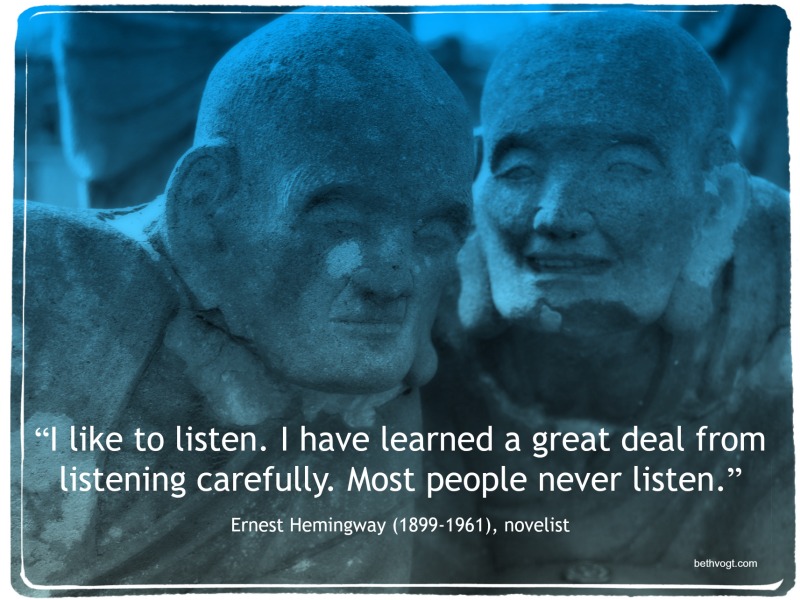
Do you prefer to talk or to listen?
I admit it: I love participating in a good conversation. A conversation between friends or family, sometimes interlaced with laughter or perhaps tears, can be refreshing. Healing.
But more and more over the years, I’ve learned to talk less and listen more.
I had to be intentional about being quiet and listening. Talking is easier than listening because, to be frank, it’s me-centered. To listen, I have to think first, before the conversation even begins, and determine to let someone else speak while I stay silent.
It’s true that when I talk to someone else — who happens to be listening to me carefully — I can discover some truths about myself. Our conversation becomes an act of self-discovery. But it’s more often true that when I listen carefully to someone else that I learn more about them. Our relationship deepens — and often I learn some truth that I can apply to my own life.
And that’s why listening is a relational win-win.
In Your Words: Which comes easier for you: talking or listening? What helps you listen to others? What have you learned from listening carefully?
In Others' Words: Listen Carefully http://bit.ly/2sxtydk #relationships #listening Share on X 'I like to listen. I have learned a great deal from listening carefully. Most people never listen.' #quote by Ernest Hemingway http://bit.ly/2sxtydk #relationships Share on X
GOODREADS GIVEAWAY: Enter the Goodreads Giveaway from June 1-30 for a chance to win one of the 100 Kindle ebooks of my latest release, Things I Never Told You.
Enter the June 1-30 #GoodReadsGiveaway to win one of the 100 #Kindle ebooks of Things I Never Told You by award-winning author @bethvogt. @LibraryJournal praised this novel for its “emotionally rich drama.” https://buff.ly/2LcUDcW Share on X
Comments 10
There was an owl lived in an oak.
The more he saw, the less he spoke.
The less he spoke, the more he heard.
O if men were like that wise bird!
Author
Nice, Andrew. Very nice.
I’m afraid talking is easier. Sometimes even after a conversation, a line or few drift back into my mind with profound impact I may have missed the first time around. Last night in a college class I taught I should have “listened” more to what one adult student, away from the classroom for many years, wasn’t saying. Thankfully, she phoned me after class as I was driving home to express her fears. She is very worth investing in and I will do all it takes to make sure she has a successful transition.
Author
Dee: You are wise to mention that sometimes we can listen after the fact and realize what we didn’t hear the first time round — and go back and finish the conversation. <3
That is a keen observation, Dee. To pay attention to what someone does not say can be as vital to our understanding as clarifying what they did say. Much like negative space in art or a rest in music gives context and nuance to the whole of a composition. What is unsaid speaks.
Being one who does not always reveal a thought or emotion, I sometimes pick up on what others don’t say. And I will surely consider it more consciously now as a listening tool.
Author
Bernadette: Wise insight, my friend: Our temperaments can influence our ability to hear what isn’t spoken out loud.
This is so true. I learned things from my husbands grandparents when they were living that he never knew–it was all because I sat and listened.
Author
Denise: Your words are such an eloquent testimony to the value of listening.
I am a talker. But I am also a reader.
Reading, like listening, is a quiet activity, but is anything but passive. At it’s best, reading engages and engrosses our thoughts, emotions, and senses. So too, especially in a group setting, I find myself “reading” the scene. Listening, observing the verbal and non-verbal cues, sensing the emotional temperature, gauging my own internal responses. Over the years, I’ve tried to teach myself to not be so busy formulating my next comment that I don’t listen intently. Still working on it. Listening takes intention and training.
Loved this post, Beth. A good reminder to stay in training.
Author
Yes, Bernadette! Somewhere through the years I learned that if you are thinking about what you want to say, you are not really listening to what a person is saying. I’ve reminded myself of this over and over again during a conversation — and brought myself back to focus on the person who is talking, rather than what I might (or might not) say next.